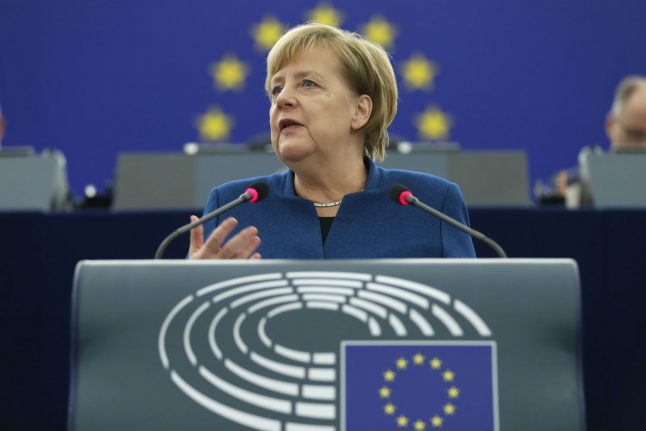Addressing European MEPs on her vision for the future of Europe, Merkel also called for a European Security Council that would centralise defence and security policy on the continent.
“What is really important, if we look at the developments of the past year, is that we have to work on a vision of one day creating a real, true European army,” Merkel told a session of European Parliament, drawing applause and some boos.
Merkel added that the proposal could be run in parallel to trans-Atlantic cooperation within the NATO military alliance, but that “only a stronger Europe is going to defend Europe”.
SEE ALSO: EU defence efforts musn't hurt transatlantic bond: NATO chief in Berlin
“Europe must take our fate into our own hands if we want to protect our community,” she added.
Merkel also said: “I will propose the establishment of a European Security Council with a rotating presidency.”
Merkel's call came as Trump again mocked French President Emmanuel Macron for his own suggestion to create a European army, a proposal that Washington fears could overshadow the NATO alliance last week, Trump slammed the idea in a tweet as “very insulting, but perhaps Europe should first pay its fair share of NATO, which the US subsidises greatly!”
European Commission President Jean-Claude Juncker said on Sunday that any European army “will have to align with NATO forces” and not be in opposition to or competition with US forces.
'Deep wound'
Merkel's ambition for Europe came just days after she announced she would
stand down after her term in office in 2021, weakened in Germany by her
migrant policy.
In 2015, Merkel in a bold move kept open German borders to a mass influx of
refugees, drawing the ire of EU partners in eastern Europe who refused to
follow suit.
In her speech, Merkel indirectly defended her policy.
Europe “cannot be successful” without “European solidarity”, she said, adding that her government “took far too long to realise the issue of refugees was an issue for the whole of Europe and not just Germany.”
“Tolerance is the soul of Europe that is an essential component of what makes us Europeans,” she said.
On Brexit, Merkel called Britain's departure from the EU “a deep wound” as she thanked EU chief negotiator Michel Barnier, in attendance in Strasbourg.
“We are all realising that it is ever more difficult to find a balanced outcome,” she said.



 Please whitelist us to continue reading.
Please whitelist us to continue reading.
NATO is no longer viable as a defense of Europe. Too many changes have taken place since the end of World War Two. A more centralized European approach is needed, without the United States as the anchor. Germany, France and Poland, being the larger of the current European states, should take the United States place as anchors for a more unified European Defense Command. But with that comes responsibility. Germany and Poland would have to renounce their non-nuclear stance on both weapons and weapon delivery systems, including having their navies become effective world response fleets, capable of making sure the nuclear threat, doesn’t have a chance to get close. No more restrictions on troop levels, and delivery systems (i.e. tanks, planes cruise missiles etc.). Other states would have to be OK with Germany being it’s Pre-WW2 strength again. In peace of coarse.